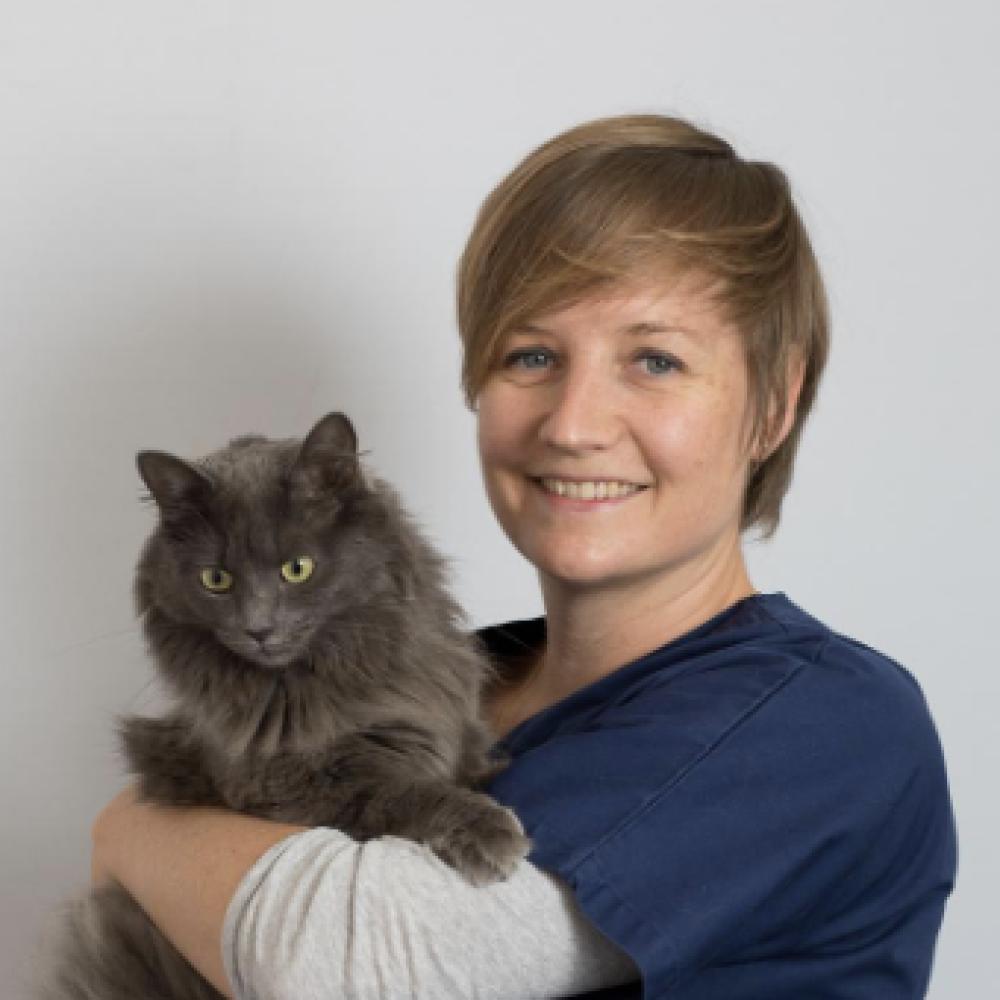Think like an emergency vet and achieve better outcomes for your patients
Emergencies are stressful situations that often fill veterinary surgeons with dread. This feeling results from the fear of the unknown and the realisation that one decision can make a difference between life and death. The Emergency Medicine and Surgery postgraduate Certificate Programme has been transformed to provide you with the knowledge and confidence you need to deal with these situations and think like an emergency vet!
The most up-to-date content in emergency practice
This online learning CPD programme is brought to you by worldwide specialists, all diplomates from European or American colleges. Content includes key emergency medical and surgical procedures around the major organ systems which have been peer-reviewed and expanded to include new topics and to provide you with more time to study. The course is built around 14 online modules, each containing an introductory video from the tutor, 9 interactive lessons for you to work through, 2 case studies, notes and pre and post-module questions.
At the end of the Emergency Medicine and Surgery Online Learning Programme, you can book three optional attendance hands-on modules. These modules (details below) will be delivered at our state-of-the-art training venue in Swindon (UK). If you are interested in attending these hands-on modules in Swindon, please inform us when registering your interest.
This programme is delivered in collaboration with RECOVER (Reassessment Campaign on Veterinary Resuscitation).
RECOVER is an initiative, a collaborative project supported by the Veterinary Emergency and Critical Care Society and the American College of Veterinary Emergency and Critical Care.
Fees for the programme include access to online RECOVER Basic Life Support and Advanced Life Support courses, providing an additional 8.5 hours of CPD. Improve International will also be running optional practical RECOVER attendance courses in the UK for delegates wishing to gain their BLS/ALS Rescuer Certification. There will be an additional charge for these attendance courses.
Upon registration to this programme, we will request permission to share delegate contact details with RECOVER in the USA for the purpose of granting access to RECOVER materials.
Learn and practise with the best professionals in the field
Our programme offers you the perfect mix of online and practical learning. The world-leading online platform will allow you to immerse yourself in each subject, through interactive materials and high-quality videos featuring different procedures. Advance your learning at your own pace, with 24/7 access whenever and wherever you are, and gain the confidence to deal with any emergency situation.
Hear what our delegates have to say
Don’t just take our word for it - our delegate feedback speaks for itself.
Key features of this programme
14 varied modules
Covering key clinical subjects in emergency medicine and surgery delivered over 2 years
3 face-to-face modules
You can choose to attend 3 optional practical modules at the end of your programme, covering emergency ultrasound, surgical techniques, and emergency procedures
Support and guidance from a Module Tutor who is a recognised specialist in small animal medicine
The specialist in the subject area will provide online support during each module and will be available to answer all your questions
Recognised Course Director
Ludivine Boiron MSC DVM DACVECC DiplACVECC MRCVS American Specialist in Veterinary Emergency and Critical Care oversees the programme ensuring that you have access to the latest content
World-leading online learning experience
Presentations, written notes, diagrams, interactive quizzes and exercises which test your knowledge as you work
Discussion forum
A discussion forum for conversation, debate and sharing cases with your peers and Module Tutors
Four sessions per month
Each module consists of four sessions spread over one month. Sessions comprise separate lessons and case-based studies to work through at your own pace
100% online
Giving you access 24/7 via our world-leading Learning Management Platform
Regular assessments
Pre-module and post-module assessments encourage you to reflect on your learning and evaluate your progress.
Dedicated Programme Tutor
A dedicated Programme Tutor who will support you every step of the way
Interactive and engaging modules
Which allow you to absorb the learning materials in an online environment.
Know-how
Join the global veterinary online learning CPD specialists and benefit from our know-how and high-quality resources
14 varied modules
Covering key clinical subjects in emergency medicine and surgery delivered over 2 years
3 face-to-face modules
You can choose to attend 3 optional practical modules at the end of your programme, covering emergency ultrasound, surgical techniques, and emergency procedures
Support and guidance from a Module Tutor who is a recognised specialist in small animal medicine
The specialist in the subject area will provide online support during each module and will be available to answer all your questions
Recognised Course Director
Ludivine Boiron MSC DVM DACVECC DiplACVECC MRCVS American Specialist in Veterinary Emergency and Critical Care oversees the programme ensuring that you have access to the latest content
World-leading online learning experience
Presentations, written notes, diagrams, interactive quizzes and exercises which test your knowledge as you work
Discussion forum
A discussion forum for conversation, debate and sharing cases with your peers and Module Tutors
Four sessions per month
Each module consists of four sessions spread over one month. Sessions comprise separate lessons and case-based studies to work through at your own pace
100% online
Giving you access 24/7 via our world-leading Learning Management Platform
Regular assessments
Pre-module and post-module assessments encourage you to reflect on your learning and evaluate your progress.
Dedicated Programme Tutor
A dedicated Programme Tutor who will support you every step of the way
Interactive and engaging modules
Which allow you to absorb the learning materials in an online environment.
Know-how
Join the global veterinary online learning CPD specialists and benefit from our know-how and high-quality resources
Programme details
Module Summary
01 - The Initial Approach to the Emergency Patient
Key learning objectives:
-
Appreciate triage systems and detail a suitable initial patient assessment
-
Explain emergency vascular access techniques including sites, catheter placement, preparations and complications including jugular and intraosseous techniques
-
Recognise the principles of initial pain management, stabilisation, and monitoring (including the rule of Kirby)
-
Review health and safety concerns and precautions including managing a situation involving potential zoonoses and nosocomial infections in the ICU
-
Recognise the pharmacokinetics, potential interactions, and adverse effects of common therapeutics agents: anti-microbials and anti-parasitic drugs (CYTP450 mechanism, MDR1 mutation, species-specific enzyme mutation/deficiency)
-
Use of physiotherapy, general nursing of CIP
-
Recognise the administrative, legal and ethical issues involving the critically ill patient
02 - Supporting the Emergency Patient and Monitoring
Key learning objectives:
-
Recognise the techniques to monitor organ function (arterial blood pressure, pulse oximetry, capnography
-
Identify the procedures to maintain the body temperature
-
Assess, recognise and treat shock
-
Develop a strategy for the treatment of shock
-
Develop your appreciation of the indications for the different types of fluid therapy with their advantages and disadvantages and the need for electrolyte supplementation
-
Explain the need to monitor for complications during treatment and to record central venous pressure
03 - Laboratory Diagnosis, Clinical Pathology and Transfusion Medicine
Key learning objectives:
- Recall sampling techniques, processing, storage,and data recording•
- Apply knowledge to using the microscope to examine blood smears, urinary sediment and basic cytology and be able to diagnose common acute conditions seen in general practice
- Assess haemostasis•Interpret clinical laboratory medicine information including haematology, biochemistry, electrolyte,and arterial and blood gas analyses
- Consider when transfusion should be considered
- Select appropriate blood products and protocols to minimise adverse outcomes
- Manage common conditions leading to haematological abnormalities requiring transfusion
- Define and explain the concept of massive transfusion
- Identify the diagnosis, pathophysiology,and treatment of acute traumatic coagulopathy
04 - Anaesthesia, Analgesia, Sedation and Therapeutics
Key Learning Objectives:
-
Compare the advantages and disadvantages of sedation and anaesthesia
-
Approach to patient stabilisation prior to anaesthesia
-
Select an appropriate parenteral, inhalational or mixed anaesthetic regimes and appreciate their relative advantages and disadvantages
-
Recognise the main anaesthetic equipment and monitoring techniques, highlighting their advantages and disadvantages
-
Explore different analgesic techniques (NSAIDs, local anaesthetics, opioids and other analgesics) and when to use them in the emergency patient
-
Decide about the use of other drugs including neuromuscular blocking agents and sedatives in the emergency patient
05 - Neurological Emergencies
Key learning objectives:
-
Describe how to perform a neurological examination
-
Select appropriate diagnostic tests and apply them to individual cases, including radiography and CSF analysis
-
Manage common neurological emergencies including head trauma, traumatic brain injury, MUO and seizures
06 - Toxicological Emergencies
Key learning objectives:
- Triage poisoned patients, recalling the general principles of intoxication
- Recognise the clinical signs and management options fortoxicities caused byinsecticides, molluscicides, rodenticides, herbicides, household preparationsandplants
- Assess the prognosis of patients presented with the common poisonings
07 - Endocrine and Metabolic Emergencies
Key learning objectives:
-
Detail the common metabolic conditions requiring urgent or emergency therapy
-
Recognise the impact of metabolic disturbances on the patient’s major body systems
-
Devise an approach to the diagnosis and management of common diseases including hypoadrenocorticism, DKA, thyroid storm and metabolic diseases related to hypoglycaemia
-
Appreciate the complications encountered during therapy, their prevention and management
08 - Cardiovascular Emergencies & CPCR
Key learning objectives:
-
Describe the cardiovascular assessment and management of patients presented with cardiovascular emergencies
-
Utilise and interpret a range of diagnostic techniques including ECGs, radiographs, echocardiographs, and laboratory data
-
Diagnose and manage acute canine congestive heart failure, feline cardiomyopathy, and aortic thromboembolism
-
Recognise and manage pericardial disease including pericardiocentesis
-
Identify and manage cardiac arrhythmias
-
Consider the predisposing factors likely to result in cardiac arrest, how this changes the approach to CPR and determining prognosis following CPR
-
Identify the various components of CPR (DABC) and their importance
09 - Urological, Reproductive and Paediatric Emergencies
Key learning objectives:
-
Apply diagnostic techniques including laboratory investigations and imaging to these cases
-
Investigate and manage common renal and urinary tract emergencies, namely urethral obstruction, ureteral obstruction and management of nonsurgical acute kidney injury
-
Recognise the principles of renal, ureteral, bladder and urethral surgery
-
Recall the steps to correctly perform a cystocentesis
-
Identify the limitations, principles of placement and maintenance of urinary catheters
-
Recall the normal reproductive physiology
-
Identify the physiological aspects involved in the conversion from foetal to neonatal circulation
-
Diagnose and establish a management plan for common reproductive and paediatric emergencies, namely C section, mastitis, pyometra and prostatitis
-
Diagnose and establish a management plan for common paediatric emergencies, including hypothermia, hypoglycaemia, failure in passive immunity and malnutrition
10 - Respiratory Tract Emergencies
Key learning objectives:
-
Recall the concepts and procedures involved in a general approach to dyspnoea
-
Triage and create a management plan for patients in respiratory distress
-
Utilise and interpret a range of diagnostic techniques for respiratory patients including auscultation, radiography, endoscopy and arterial blood gas analysis to localise the underlying cause
-
Appreciate the methods of oxygen delivery and be able to monitor the efficacy of treatment
-
Review the problems associated with oxygen delivery
-
Explain the techniques available for drainage of the pleural cavity
11 - Principles of Surgery and Approach to Trauma and Wound Management
Key learning objectives:
-
Stabilise a patient prior to surgery, plan surgery and manage complications
-
Appreciate the indications for immediate surgical intervention
-
Define damage-controlled resuscitation and identify the cases where it applies
-
Recall surgical asepsis, theatre protocol and the rational use of anti-microbials in surgical patients
-
Approach the acute management of haemostasis, abdominal and respiratory trauma
-
Approach external soft tissue wounds, myocardial injury, and musculoskeletal trauma
12 - Emergencies in Rabbits, Rodents and Cage Birds
Key learning objectives:
-
Interpret the practical findings of a physical examination
-
Formulate a diagnostic approach to common presentations of emergency conditions
-
Manage common emergency conditions
-
Approach the anaesthesia and analgesia of these species in emergency situations
13 - Ophthalmological Emergencies
Key learning objectives:
-
Describe how to perform a systematic ophthalmological examination
-
Recognise normal features and variants
-
Formulate a diagnostic approach to common presentations including the red eye, ocular pain, ocular discharge, blindness, proptosis and retinal detachment
-
Manage common ocular conditions including corneal ulceration, uveitis, and glaucoma
-
Identify ocular manifestations of systemic disease
-
Select ocular medications based on their therapeutical principles
14 - Gastrointestinal Emergencies and Nutrition in the Critically Ill Patient
Key learning objectives:
-
Approach the “acute abdomen”
-
Recognise common emergency conditions affecting the oesophagus, stomach, small intestine, large intestine, liver, and pancreas
-
Formulate a diagnostic plan, including the use of imaging modalities, and effective monitoring strategies for these cases
-
Select the appropriate surgical intervention
-
Assess acute malnutrition
-
Recognise the procedures to provide enteral, total parenteral and partial parenteral nutrition
-
Create a diagnostic and management plan to approach the refeeding syndrome
Optional Module Summary
***Please note, this course is designed to be taken at the end of the Emergency Medicine and Surgery online learning programme when deleagtes have attended all 14 modules***
At the end of the Emergency Medicine and Surgery online learning programme, you can choose to book three optional attendance practical modules, delivered by Ludivine Boiron. These modules (details below) will be delivered at our state-of-the-art training venue using the latest equipment and capped to a maximum of 12 delegates. For those wanting to book the full programme, these modules will be at an exclusive price. You can also book these at a later date by contacting your Programme Tutor. Please note, we will be opening these up to our wider veterinary community so let us know as soon as possible, so we can guarantee you a place!
Entry Requirements
Initial registration for the Optional Practical Attendance Modules is open on a first come first serve basis to delegates booking onto the Emergency Medicine and Surgery Online Learning Programme until 4th February 2027. Any bookings made thereafter will be subject to review and acceptance. Improve International has the right to refuse a booking if it does not meet the entry requirements stated above. Please contact us for further information.
01 - Ultrasound
Key Learning Objectives:
-
Recall the evolution of POCUS in veterinary medicine
-
Describe normal and abnormal images
-
Recognise pneumothorax, B lines (and their significance), shred sign and lung hepatisation
-
Review literature
-
Practical component:
-
The thorax
-
Review the different windows to perform a Thoracic POCUS
-
Assess the pulmonary and cardiographic views
-
Recognise the glide sign, the curtain size and the caudal vena cava
-
Perform an approach to the heart considering La/ao view and ratio
-
The abdomen
-
Review the different windows to perform an Abdominal POCUS
-
Interpret the scoring system
02 - Emergency Procedures - Tubes & Drains
Key Learning Objectives:
During this practical session you will have an opportunity to practise the following techniques:
-
CPCR
-
Feeding tubes placement
-
Arterial blood collection
-
Central venous catheter placement
-
Nasal cannula placement
-
Venous cut down
-
Tracheotomy and chest drain placement
03 - Emergency Procedures - Abdominal & Urogenital
Key Learning Objectives:
During this practical session you will have an opportunity to practise the following techniques:
-
Emergency abdominal surgery including the approach to the acute abdomen and peritonitis, enterotomy and enterectomy
-
Gastric dilatation/ volvulus and gastropexies
-
Splenectomy
-
Perineal urethrostomy in the cat
Qualifications
Our Emergency Medicine and Surgery Online Learning Programme offers you a comprehensive range of structured learning with the ultimate flexibility to access the training that you want whilst working around your busy practice life.
You can choose to let the Programme give you new knowledge and skills to take back to practice or you can work towards a recognised qualification.
General Practitioner Certificate (GPCert)
By attending the full online structured programme and following successful assessment including an exam you can gain the GPCert awarded by the International School of Veterinary Postgraduate Studies (ISVPS).
Only registered veterinary surgeons who have been qualified for a minimum of one year can apply to undertake a General Practitioner Certificate.
Postgraduate Certificate (PgC)
A route to a PgC in Small Animal Medicine is available through our partnership with Harper Adams University (HAU).
The PgC is a recognised higher education qualification demonstrating that you have achieved the required standard within a designated subject. The qualification represents Masters Level 7 within the Quality Assurance Agency’s framework for higher and further education. In order to apply for this route, additional assessments will be necessary; please contact us for further information.
For GPCert and PgC fees, please see our pricing table – in the pricing tab.
RCVS Advanced Practitioner Status
After successfully completing your Postgraduate Certificate you can apply for the RCVS Advanced Practitioner Status. This is subject to meeting all of the other entry requirements set out by the RCVS in the Applicant Guidance Notes.
Speakers
Pricing
£7,310.00
£2,499.00
£2,349.00
Payment & VAT Information
1. Many of our courses come with deferred payment and instalment options. Click “Book Now” to see what’s available for this course.
2. All prices will be displayed exclusive of local sales tax.
Payment Terms & Conditions
Registration Information
100% Satisfaction
We're completely confident in the quality of our training and CPD. So much so that if you're not 100% satisfied with your certificate course, we'll give you a 100% refund. Just get in touch with us within 30 days of your start date and we'll sort the rest. T's and C's apply.
Find out moreFAQs
Practical Sessions
Where are practical CPD courses or face-to-face modules held?
What will the timings be for face-to-face certificate modules and practical CPD sessions? How will my day be structured?
Where do the cadavers come from for the practical CPD and surgical modules/courses?
What should I wear to a practical CPD course/module?
I will be travelling from overseas, do I need a Visa?
Will the dogs used for practical CPD courses be sedated?
Will the dogs used for scanning have any abnormalities?
Are the dogs used for ultrasound CPD clipped?
Are cats used for any of the ultrasound courses?
Postgraduate Certificates (PgCs)
Royal College of Veterinary Surgeons (RCVS) Advanced Practitioner (AP) Status – what has the RCVS announced?
What is a Postgraduate Certificate (PgC)?
Am I eligible for the PgC programme?
How do I enrol on the PgC programme?
I have previously achieved a GPCert. Can I still upgrade to a PgC?
Is the PgC equivalent to the RCVS CertAVP, BSAVA PGCert, and other university-awarded veterinary postgraduate certificates?
How are Improve’s PgCs different from other providers?
Will a PgC enable me to apply for the RCVS Advanced Practitioner Status?
How will I be assessed for the PgC?
What does the PgC fee include?
What’s not included in the PgC fee? Do I need to budget for further costs?
Payments & Finance
What payment methods do you accept?
Do you offer any flexible payment plans?
What payment methods can I use for setting up a direct debit?
Do you issue separate invoices for each instalment?
Why was my Direct Debit payment not charged on the day that is established in my payment plan?
Why couldn’t I make payment during check-out?
Where can I find the bank details for the bank/wire transfer?
What happens if my circumstances change and I need to cancel my order?
When is payment for my veterinary CPD course due?
How much do the veterinary CPD courses and certificate programmes cost?
My course includes assessments with HAU, how do I make payment for these?
My CPD course includes assessments with ISVPS, how do I make payment for these?
Can I pay by Direct Debit?
Online Learning & Platform
Is there a discussion forum or way to interact with other delegates?
What happens if I lose internet connection or need to pause my session?
How do I track my progress in each online module?
Can I access course materials on mobile devices or offline?
What are the technical requirements to access online courses?
If coming from a non-European country – how would face-to-face module attendance work for the PgC?
How do I register for the GPCert and/or the PgC?
Is the PgC programme recognised by other countries?
General Practitioner Certificates (GPCerts)
What is the criteria for enrolling in a General Practitioner Certificate programme?
What is the difference between a GPCert and a PgC?
Can I use this veterinary certificate programme towards my veterinary CPD hours?
How long does a General Practitioner Certificate (GPCert) take to achieve?
I want to register for a veterinary certificate course but I may be away for some of the modules. Does this mean I will miss out?
How long do I have to finish the modules for my GPCert?
What resources will be available to support me through the certificate programme?
How long do I have access to the course material for?
How will I be assessed for the GPCert?
What happens if I am not eligible to sit the assessments and/or exam with my cohort?
What does the General Practitioner Certificate programme fee include?
What’s not included in the certificate programme fee? Do I need to budget for further costs?
Will my veterinary postgraduate qualification be recognised in other countries?
Can I take a postgraduate certificate if coming from a non-European country? How do face-to-face modules work?
How are Improve’s PgC programmes different to other providers?
Where are the taught programmes held?
Are Improve’s Postgraduate Certificates academically equivalent to the RCVS CertAVP and other postgraduate certificates?
Over what time period can I take the taught modules?
I want to register on a modular course but I may be away for some of the modules. Does this mean I will miss out?
What resources will be available to support me through the PgC?
No ordinary online learning experience
Learn with the leading global provider of online veterinary CPD!
Find out more


















